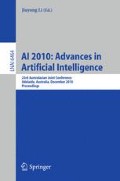Abstract
We propose a formalism for reasoning about actions based on multi-modal logic which allows for expressing observations as first-class objects. We introduce a new modal operator, namely [o |α], which allows us to capture the notion of perceiving an observation given that an action has taken place. Formulae of the type [o |α]ϕ mean ’after perceiving observation o, given α was performed, necessarily ϕ’. In this paper, we focus on the challenges concerning sensing with explicit observations, and acting with nondeterministic effects. We present the syntax and semantics, and a correct and decidable tableau calculus for the logic.
Access this chapter
Tax calculation will be finalised at checkout
Purchases are for personal use only
Preview
Unable to display preview. Download preview PDF.
References
Castilho, M., Gasquet, O., Herzig, A.: Formalizing action and change in modal logic I: The frame problem. Journal of Logic and Computation 9(5), 701–735 (1999)
Castilho, M., Herzig, A., Varzinczak, I.: It depends on the context! A decidable logic of actions and plans based on a ternary dependence relation. In: 9th International Workshop on Nonmonotonic Reasoning, NMR 2002 (2002)
Demolombe, R., Herzig, A., Varzinczak, I.: Regression in modal logic. Journal of Applied Non-Classical Logics 13(2), 165–185 (2003)
Gabaldon, A., Lakemeyer, G.: \(\mathcal{ESP}\): A logic of only-knowing, noisy sensing and acting. In: Proc. of 22nd Natl. Conf. on Artificial Intelligence (AAAI 2007), pp. 974–979. AAAI Press, Menlo Park (2007)
Harel, D., Kozen, D., Tiuryn, J.: Dynamic Logic. MIT Press, Cambridge (2000)
Kooi, B.: Probabilistic dynamic epistemic logic. Journal of Logic, Language and Information 12(4), 381–408 (2003)
Kowalski, R., Sergot, M.: A logic-based calculus of events. New Generation Computing 4, 67–95 (1986)
Lakemeyer, G., Levesque, H.: A semantic characterization of a useful fragment of the situation calculus with knowledge. In: Special issue in honor of John McCarthy, Artificial Intelligence, Elsevier, Amsterdam (2010)
McCarthy, J., Hayes, P.: Some philosophical problems from the standpoint of artificial intelligence. Machine Intelligence 4, 463–502 (1969)
Monahan, G.E.: A survey of partially observable Markov decision processes: Theory, models, and algorithms. Management Science 28(1), 1–16 (1982)
Popkorn, S.: First Steps in Modal Logic. Cambridge University Press, Cambridge (1994)
Reiter, R.: Knowledge in action: logical foundations for specifying and implementing dynamical systems. MIT Press, Massachusetts (2001)
Rens, G., Varzinczak, I., Meyer, T.: Partially observable Markov decision logic, Part I: Introducing explicit observation constants, KRR-10-01. Tech. rep., Knowledge Representation and Reasoning, Meraka Institute, CSIR, Pretoria, South Africa (June 2010), http://krr.meraka.org.za/publications/2010
Sack, J.: Extending probabilistic dynamic epistemic logic. Synthese 169, 124–257 (2009)
Van Benthem, J., Gerbrandy, J., Kooi, B.: Dynamic update with probabilities. Studia Logica 93(1), 67–96 (2009)
Van Ditmarsch, H., Van der Hoek, W., Kooi, B.: Dynamic Epistemic Logic. Springer, Dordrecht (2007)
Author information
Authors and Affiliations
Editor information
Editors and Affiliations
Rights and permissions
Copyright information
© 2010 Springer-Verlag Berlin Heidelberg
About this paper
Cite this paper
Rens, G., Varzinczak, I., Meyer, T., Ferrein, A. (2010). A Logic for Reasoning about Actions and Explicit Observations. In: Li, J. (eds) AI 2010: Advances in Artificial Intelligence. AI 2010. Lecture Notes in Computer Science(), vol 6464. Springer, Berlin, Heidelberg. https://doi.org/10.1007/978-3-642-17432-2_40
Download citation
DOI: https://doi.org/10.1007/978-3-642-17432-2_40
Publisher Name: Springer, Berlin, Heidelberg
Print ISBN: 978-3-642-17431-5
Online ISBN: 978-3-642-17432-2
eBook Packages: Computer ScienceComputer Science (R0)

